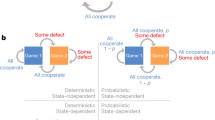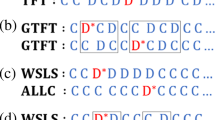Abstract
Cooperation is fundamental in animal societies including humans, yet how to divide the resources obtained through cooperation is not a trivial question. The Nash demand game provides an excellent framework to study resource division between selfish agents. We herein study evolutionary dynamics of strategies in the Nash demand game. Our evolutionary model confirms the traditional prediction based on a Nash-equilibrium analysis that any possible resource division can be a stable outcome. Next, we study the effect of mutation (or exploration in cultural evolution). We model mutation as diffusion in the strategy space and analyze a pair of reaction diffusion equations. We find that the introduction of mutation to the system dramatically alters evolutionary outcomes and leads to a fair split of resources between two agents. We also study the effect of asymmetry in selection intensity on the resulting pattern of resource division.
Similar content being viewed by others
References
Alexander RD (1987) The biology of moral systems. Aldine de Gruyter, New York
Axelrod R (1984) The evolution of cooperation. Basic Books, New York
Axelrod R, Hamilton WD (1981) The evolution of cooperation. Science 211:1390–1396
Binmore K (2007) Playing for real: a text on game theory. Oxford University Press, London
Clutton-Brock T (2009) Cooperation between non-kin in animal societies. Nature 462:51–57
Creel S, Creel NM (2001) The African wild dog: behavior, ecology and conservation. Princeton University Press, Princeton
Feh C (1999) Alliances and reproductive success in Camargue stallions. Anim Behav 57:705–713
Hamilton WD (1964) The genetical evolution of social behaviour, I & II. J Theor Biol 7:1–52
Hofbauer J, Sigmund K (1998) Evolutionary games and population dynamics. Cambridge University Press, Cambridge
Nash JF (1950) The bargaining problem. Econometrica 18:155–162
Nash JF (1953) Two-person cooperative games. Econometrica 21:128–140
Nowak MA, May RM (1992) Evolutionary games and spatial chaos. Nature 359:826–829
Nowak MA, Sigmund K (1998) Evolution of indirect reciprocity by image scoring. Nature 393:573–577
Ohtsuki H, Hauert C, Lieberman E, Nowak MA (2006) A simple rule for the evolution of cooperation on graphs and social networks. Nature 441:502–505
Packer C, Pusey AE, Eberly LE (2001) Egalitarianism in femal African lions. Science 293:690–693
Rubinstein A (1982) Perfect equilibrium in a bargaining model. Econometrica 50:97–110
Toquenaga Y, Suzuki Y (2005) Evolution of generosity in the demand game. Popul Ecol 47:31–39
Traulsen A, Hauert C, De Silva H, Nowak MA, Sigmund K (2009) Exploration dynamics in evolutionary games. Proc Natl Acad Sci USA 106:709–712
Trivers RL (1971) The evolution of reciprocal altruism. Q Rev Biol 46:35–57
Watts DP (1998) Coalitionary mate guarding by male chimpanzees at Ngogo, Kibale National Park, Uganda. Behav Ecol Sociobiol 44:43–55
West SA, Griffin AS, Gardner A (2007a) Evolutionary explanations for cooperation. Curr Biol 17:R661–R672
West SA, Griffin AS, Gardner A (2007b) Social semantics: altruism, cooperation, mutualism, strong reciprocity and group selection. J Evol Biol 20:415–432
West SA, Gardner A (2010) Altruism, spite, and greenbeards. Science 327:1341–1344
West SA, El Mouden C, Gardner A (2011) Sixteen common misconceptions about the evolution of cooperation in humans. Evol Hum Behav. doi:10.1016/j.evolhumbehav.2010.08.001
Young HP (1993) The evolution of conventions. Econometrica 61:57–84
Author information
Authors and Affiliations
Corresponding author
Rights and permissions
About this article
Cite this article
Ohtsuki, H. Evolutionary Dynamics of the Nash Demand Game: A Diffusion Approach. Dyn Games Appl 1, 449–461 (2011). https://doi.org/10.1007/s13235-011-0012-9
Published:
Issue Date:
DOI: https://doi.org/10.1007/s13235-011-0012-9




